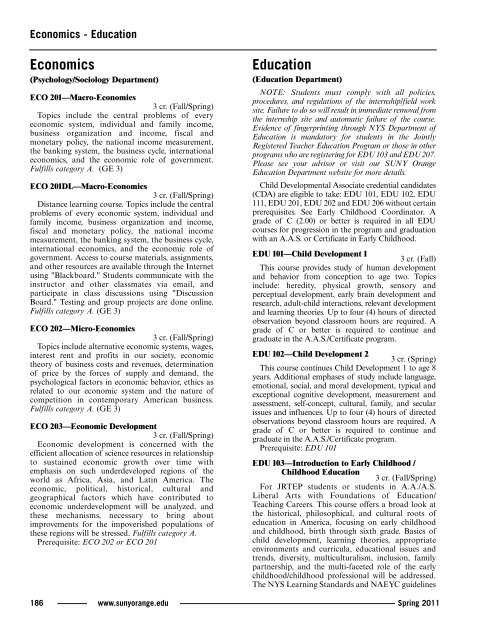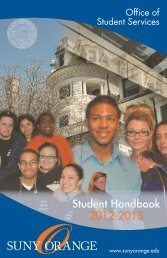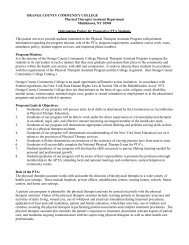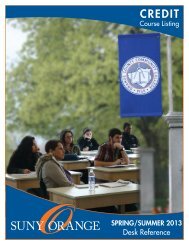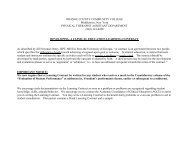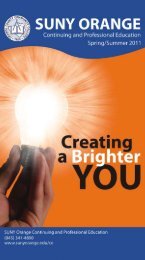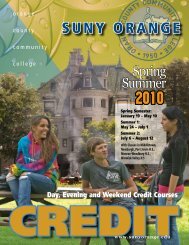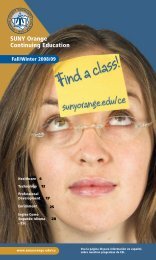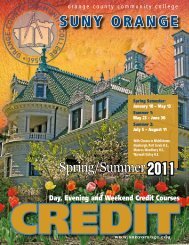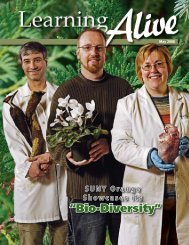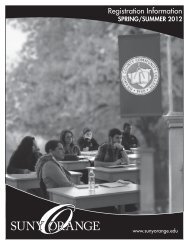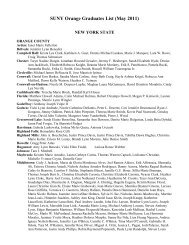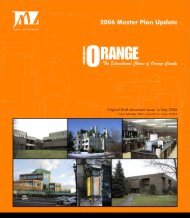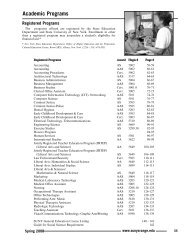Economics - EducationEconomics(Psychology/Sociology Department)ECO 201—Macro-Economics3 cr. (Fall/<strong>Spring</strong>)Topics include the central problems of everyeconomic system, individual and family income,business organization and income, fiscal andmonetary policy, the national income measurement,the banking system, the business cycle, internationaleconomics, and the economic role of government.Fulfills category A. (GE 3)ECO 201DL—Macro-Economics3 cr. (Fall/<strong>Spring</strong>)Distance learning course. Topics include the centralproblems of every economic system, individual andfamily income, business organization and income,fiscal and monetary policy, the national incomemeasurement, the banking system, the business cycle,international economics, and the economic role ofgovernment. Access to course materials, assignments,and other resources are available through the Internetusing "Blackboard." Students communicate with theinstructor and other classmates via email, andparticipate in class discussions using "DiscussionBoard." Testing and group projects are done online.Fulfills category A. (GE 3)ECO 202—Micro-Economics3 cr. (Fall/<strong>Spring</strong>)Topics include alternative economic systems, wages,interest rent and profits in our society, economictheory of business costs and revenues, determinationof price by the forces of supply and demand, thepsychological factors in economic behavior, ethics asrelated to our economic system and the nature ofcompetition in contemporary American business.Fulfills category A. (GE 3)ECO 203—Economic Development3 cr. (Fall/<strong>Spring</strong>)Economic development is concerned with theefficient allocation of science resources in relationshipto sustained economic growth over time withemphasis on such underdeveloped regions of theworld as Africa, Asia, and Latin America. Theeconomic, political, historical, cultural andgeographical factors which have contributed toeconomic underdevelopment will be analyzed, andthese mechanisms, necessary to bring aboutimprovements for the impoverished populations ofthese regions will be stressed. Fulfills category A.Prerequisite: ECO 202 or ECO 201Education(Education Department)NOTE: Students must comply with all policies,procedures, and regulations of the internship/field worksite. Failure to do so will result in immediate removal fromthe internship site and automatic failure of the course.Evidence of fingerprinting through NYS Department ofEducation is mandatory for students in the JointlyRegistered Teacher Education Program or those in otherprograms who are registering for EDU 103 and EDU 207.Please see your advisor or visit our <strong>SUNY</strong> <strong>Orange</strong>Education Department website for more details.Child Developmental Associate credential candidates(CDA) are eligible to take: EDU 101, EDU 102, EDU111, EDU 201, EDU 202 and EDU 206 without certainprerequisites. See Early Childhood Coordinator. Agrade of C (2.00) or better is required in all EDUcourses for progression in the program and graduationwith an A.A.S. or Certificate in Early Childhood.EDU 101—Child Development 13 cr. (Fall)This course provides study of human developmentand behavior from conception to age two. Topicsinclude: heredity, physical growth, sensory andperceptual development, early brain development andresearch, adult-child interactions, relevant developmentand learning theories. Up to four (4) hours of directedobservation beyond classroom hours are required. Agrade of C or better is required to continue andgraduate in the A.A.S./Certificate program.EDU 102—Child Development 23 cr. (<strong>Spring</strong>)This course continues Child Development 1 to age 8years. Additional emphases of study include language,emotional, social, and moral development, typical andexceptional cognitive development, measurement andassessment, self-concept, cultural, family, and secularissues and influences. Up to four (4) hours of directedobservations beyond classroom hours are required. Agrade of C or better is required to continue andgraduate in the A.A.S./Certificate program.Prerequisite: EDU 101EDU 103—Introduction to Early Childhood /Childhood Education3 cr. (Fall/<strong>Spring</strong>)For JRTEP students or students in A.A./A.S.Liberal Arts with Foundations of Education/Teaching Careers. This course offers a broad look atthe historical, philosophical, and cultural roots ofeducation in America, focusing on early childhoodand childhood, birth through sixth grade. Basics ofchild development, learning theories, appropriateenvironments and curricula, educational issues andtrends, diversity, multiculturalism, inclusion, familypartnership, and the multi-faceted role of the earlychildhood/childhood professional will be addressed.The NYS Learning Standards and NAEYC guidelines186 www.sunyorange.edu <strong>Spring</strong> <strong>2011</strong>
Educationwill be included. Twenty-four (24) hours of guidedfield work at two diverse settings is required. A gradeof B- is required in the JRTEP track. Evidence ofcompletion of fingerprinting through NYS Dept. ofEducation is required.Prerequisite: ENG 101EDU 105—Preparing to Teach Young Children2 cr. (Fall)This course addresses the skills and conceptsnecessary for the classroom teacher of young children.Emphasis is placed on putting theory into practice.Such topics as daily schedule, lesson planning,transitions, balancing individual and small group work,communication strategies, classroom guidance,evaluation techniques, and portfolio preparation will beincluded. Personal learning and teaching styles, one’sphilosophy of excellent education, and developing as aprofessional will also be examined. A grade of C orbetter is required to continue and graduate in theA.A.S./Certificate program.EDU 107—Mandated Training1 cr. (Fall/<strong>Spring</strong>)This course provides training in both theidentification and reporting of child abuse andmaltreatment, and in school violence prevention andintervention. Intended primarily for schooladministrators, teachers, instructional aides, and childcare professionals, other mandated reportercategories for whom this course may apply include: allhealth practitioners, EMTs, foster parents, socialworkers, law enforcement, probation and paroleofficers, film and photographic print processors,clergy, firefighters, animal control and humane societyofficers, child visitation monitors, and others. Uponsuccessful completion of the course, students willreceive State Education Department Certificate formsfor use in documenting their satisfactory course work.A grade of C or better is required to continue andgraduate in the A.A.S./Certificate program.EDU 109—Fundamentals of Early ChildhoodLanguage Arts3 cr. (Fall)This course presents the progressive, interwovendevelopment in early childhood of the four languagearts: listening, speaking, reading, and writing. Boththe natural processes of language arts developmentand the educator’s role in providing a supportiveenvironment will be discussed. Adaptationsuggestions for children with disabilities, English as anadditional language, or limited literacy experienceswill be explored. Learning appropriate techniques willutilize major authors, illustrators, and examples ofyoung children’s literature. A grade of C or better isrequired to continue and graduate in the A.A.S./Certificate program.Prerequisite: ENG 101EDU 111—Childhood Health and Safety3 cr. (Fall, <strong>Spring</strong>)Topics include: physical and emotional needs ofinfants and children; development of healthy physicalself-concept; chronic and communicable diseases,immunizations; first aid; teething and dental health;accident prevention; recognition and prevention ofsexual abuse; identifying problems and screeningtechniques for vision and hearing; nutritional needs,appropriate menus and meal planning. A grade of Cis required to continue and graduate in theA.A.S./Certificate program.EDU 201—Observation and Assessment2 lect., 2 lab., 3 cr. (Fall)This interactive course combines the observationand assessment of children, preschool through secondgrade, in all developmental areas. By using a variety ofprofessional techniques and tools during weekly fieldwork, students will objectively and accurately observeand record children’s behavior. Corresponding theory,appropriate practices, environments, and curriculawill be related to field work. Use of NAEYCguidelines will be included. Twenty-four (24) hours offield work in diverse settings is required. A grade of Cor better is required to continue and graduate in theA.A.S./Certificate program.Prerequisite: EDU 101, EDU 102, PSY 101**EDU 202—Infant and Toddler Developmentand Curriculum 2 lect., 2 lab., 3 cr. (<strong>Spring</strong>)Study, education, and care of children, pre-natalthrough age three, according to basic developmentprinciples and current research will be explored.Techniques to stimulate cognitive, language, physical,social, and emotional growth, and to createappropriate environments, curricula, and care will bestudied. Preparation for the diverse roles of theinfant/toddler professional are included. Guidelinesfrom NAEYC are used. Thirty-two (32) hours of fieldwork in diverse settings is required. A grade of C orbetter is required to continue and graduate in theA.A.S./Certificate program.Prerequisite: EDU 101, EDU 102, EDU 111, PSY 101**EDU 203—Child Care Curriculum Developmentand Field Experience 13 lect., 6 lab., 5 cr. (Fall)The student gains experience in early childhoodthrough supervised participation in local facilitieswhere, over the course of a year, they take increasingresponsibility in the various roles of early childhoodprofessionals. In a weekly seminar/lecture, studentsdiscuss their field experiences, and learn to developearly child education curricula including these areas:Art and Creative Experiences, Music, Movement,Physical Activities, Creative Play, Language Arts,Beyond Books, Discipline and ClassroomManagement*. A grade of C is required to continueand graduate in the A.A.S. program<strong>Spring</strong> <strong>2011</strong>www.sunyorange.edu187
- Page 1 and 2:
Orange CountyCommunity CollegeSprin
- Page 3 and 4:
Message from the PresidentDear Stud
- Page 5 and 6:
About SUNY OrangeThe Middletown Cam
- Page 7:
About SUNY OrangeHudson Valley Educ
- Page 10 and 11:
Admissions Procedures and Requireme
- Page 12 and 13:
Admissions Procedures and Requireme
- Page 14 and 15:
Admissions Procedures and Requireme
- Page 16 and 17:
Educational Partnershipsdevelopment
- Page 18 and 19:
Community PartnershipsThe Departmen
- Page 20 and 21:
Refund PoliciesRefund PoliciesStude
- Page 22 and 23:
Financial AidA variety of financial
- Page 24 and 25:
Financial Aiddependents, or C) a de
- Page 26 and 27:
Financial AidThe student must be en
- Page 28 and 29:
Financial Aidfor 10 to 15 hours wor
- Page 30 and 31:
Financial AidCHOOSING A REPAYMENT P
- Page 32 and 33:
Financial AidWe encourage students
- Page 34 and 35:
Scholarship Opportunities 2010 - 20
- Page 37 and 38:
Academic Policies and ProceduresThe
- Page 39 and 40:
Course Policies and Proceduressched
- Page 41 and 42:
Grades and Grading / Academic Stand
- Page 43 and 44:
• Have a CumGPA lower than 2.0 at
- Page 45 and 46:
class absences and may withdraw stu
- Page 47 and 48:
student is encouraged to contact th
- Page 49 and 50:
Student ServicesStudent Services is
- Page 51 and 52:
Student Servicesexperiences. We wor
- Page 53 and 54:
Student ActivitiesParking TagsParki
- Page 55 and 56:
Learning Assistance ServicesSUNY Or
- Page 57 and 58:
Permitted Credit Courses for Studen
- Page 59 and 60:
Permitted Credit Courses for Studen
- Page 61:
Learning ResourcesThe Writing Consu
- Page 65 and 66:
Degrees / General Degree Requiremen
- Page 67 and 68:
AccountingDegree Awarded: Associate
- Page 69 and 70:
AccountingDegree Awarded: Associate
- Page 71 and 72:
Accounting ProceduresDegree Awarded
- Page 73 and 74:
Architectural TechnologyDegree Awar
- Page 75 and 76:
Business AdministrationDegree Award
- Page 77 and 78:
Business ManagementDegree Awarded:
- Page 79 and 80:
Business StudiesDegree Awarded: Cer
- Page 81 and 82:
Clerical Office AssistantDegree Awa
- Page 83 and 84:
Computer Information Technology-Net
- Page 85 and 86:
Computer Information Technology-Web
- Page 87 and 88:
Computer ScienceDegree Awarded: Ass
- Page 89 and 90:
Criminal JusticeDegree Awarded: Ass
- Page 91 and 92:
Criminal Justice-PoliceDegree Award
- Page 93 and 94:
Cyber SecurityDegree Awarded: Assoc
- Page 95 and 96:
Dental HygieneDegree Awarded: Assoc
- Page 97 and 98:
Early Childhood Development and Car
- Page 99 and 100:
Early Childhood Development and Car
- Page 101 and 102:
Electrical Technology-Telecommunica
- Page 103 and 104:
Emergency ManagementDegree Awarded:
- Page 105 and 106:
Engineering ScienceDegree Awarded:
- Page 107 and 108:
Exercise StudiesDegree Awarded: Ass
- Page 109 and 110:
Honors ProgramDegree Awarded: Assoc
- Page 111 and 112:
Human ServicesDegree Awarded: Assoc
- Page 113 and 114:
International StudiesDegree Awarded
- Page 115 and 116:
Jointly Registered Teacher Educatio
- Page 117 and 118:
Jointly Registered Teacher Educatio
- Page 119 and 120:
Jointly Registered Teacher Educatio
- Page 121 and 122:
Jointly Registered Teacher Educatio
- Page 123 and 124:
Jointly Registered Teacher Educatio
- Page 125 and 126:
Law Enforcement/SecurityDegree Awar
- Page 127 and 128:
Liberal Arts: Humanities and Social
- Page 129 and 130:
Liberal Arts: Individual StudiesDeg
- Page 131 and 132:
Liberal Arts and Sciences: Mathemat
- Page 133 and 134:
MarketingDegree Awarded: Associate
- Page 135 and 136:
Medical Laboratory TechnologyDegree
- Page 137 and 138: Medical Office AssistantDegree Awar
- Page 139 and 140: NursingDegree Awarded: Associate in
- Page 141 and 142: NursingDegree Awarded: Associate in
- Page 143 and 144: Occupational Therapy AssistantDegre
- Page 145 and 146: Office TechnologiesDegree Awarded:
- Page 147 and 148: Performing Arts: MusicDegree Awarde
- Page 149 and 150: Physical Therapist AssistantDegree
- Page 151 and 152: Radiologic TechnologyDegree Awarded
- Page 153 and 154: Teaching AssistantDegree Awarded: C
- Page 155 and 156: TelecommunicationsDegree Awarded: C
- Page 157 and 158: Visual Communications Technology: G
- Page 159 and 160: SUNY General Education Course Listi
- Page 161: Non-SUNY Elective CategoriesThe fol
- Page 164 and 165: Online LearningSUNY Orange currentl
- Page 166 and 167: Accounting - AnthropologyACC 211—
- Page 168 and 169: Architectural Technology - ArtARC 2
- Page 170 and 171: Artand medium. A museum trip may be
- Page 172 and 173: BiologyBiology(Biology Department)B
- Page 174 and 175: Biology - BusinessBIO 202—Compara
- Page 176 and 177: ChemistryChemistry(Science, Enginee
- Page 178 and 179: CommunicationOrange college radio w
- Page 180 and 181: Computer Information Technology (CI
- Page 182 and 183: Computer ScienceComputer Science(Ap
- Page 184 and 185: Criminal Justiceadministration as t
- Page 186 and 187: Dental HygieneDental Hygiene(Dental
- Page 190 and 191: EducationPrerequisite: EDU 101, EDU
- Page 192 and 193: EngineeringEngineering(Science, Eng
- Page 194 and 195: Englishconstruction of expository e
- Page 196 and 197: English - Field Studies: Travelrela
- Page 198 and 199: Geology - HealthGeology(Science, En
- Page 200 and 201: History - Honorsand ends with the P
- Page 202 and 203: Honors - Human Servicestrends of cu
- Page 204 and 205: Management - MarketingManagement(Bu
- Page 206 and 207: Mathematicsmathematics, and growth
- Page 208 and 209: Medical Laboratory TechnologyMLT 10
- Page 210 and 211: MusicMUS 111—Audio Engineering an
- Page 212 and 213: Music - NursingMUS 226—Elements o
- Page 214 and 215: NursingPrerequisites: ENG 101-2, BI
- Page 216 and 217: Occupational Therapy Assistant - Of
- Page 218 and 219: Philosophy & Religion - Physical Ed
- Page 220 and 221: Physical Education/Exercise Studies
- Page 222 and 223: Physical Therapist AssistantPhysica
- Page 224 and 225: PhysicsPhysics(Science, Engineering
- Page 226 and 227: Psychology - Radiologic TechnologyP
- Page 228 and 229: Radiologic Technology - SociologyRA
- Page 231 and 232: State University of New YorkBoard o
- Page 233 and 234: Administrative StaffCareer and Inte
- Page 235 and 236: Faculty and Professional StaffEilee
- Page 237 and 238: Faculty and Professional StaffJames
- Page 239 and 240:
Faculty and Professional StaffKathl
- Page 241 and 242:
Faculty and Professional StaffEric
- Page 243 and 244:
Faculty and Professional StaffLione
- Page 245 and 246:
Adjunct FacultySandra Aber (2008)In
- Page 247 and 248:
Adjunct FacultyJohn Cosco (2005)Ass
- Page 249 and 250:
Adjunct FacultyLinda Gendelman (200
- Page 251 and 252:
Adjunct FacultyEvelyn Kinbar (1997)
- Page 253 and 254:
Adjunct FacultySue Misiak (2002)Ins
- Page 255 and 256:
Adjunct FacultyPeggy Roda (2003)Ins
- Page 257 and 258:
Adjunct FacultyKaren Vespo (2008)In
- Page 259 and 260:
Advisory BoardsAccountingGary Cassi
- Page 261 and 262:
Advisory BoardsBarbara Hansen, RNSt
- Page 263 and 264:
Advisory BoardsBon Secours Communit
- Page 265 and 266:
Academic CalendarSPRNG 2011January
- Page 267 and 268:
Index24 Credit Hour Program .......
- Page 269 and 270:
DirectionsMiddletown, NY CampusNewb


